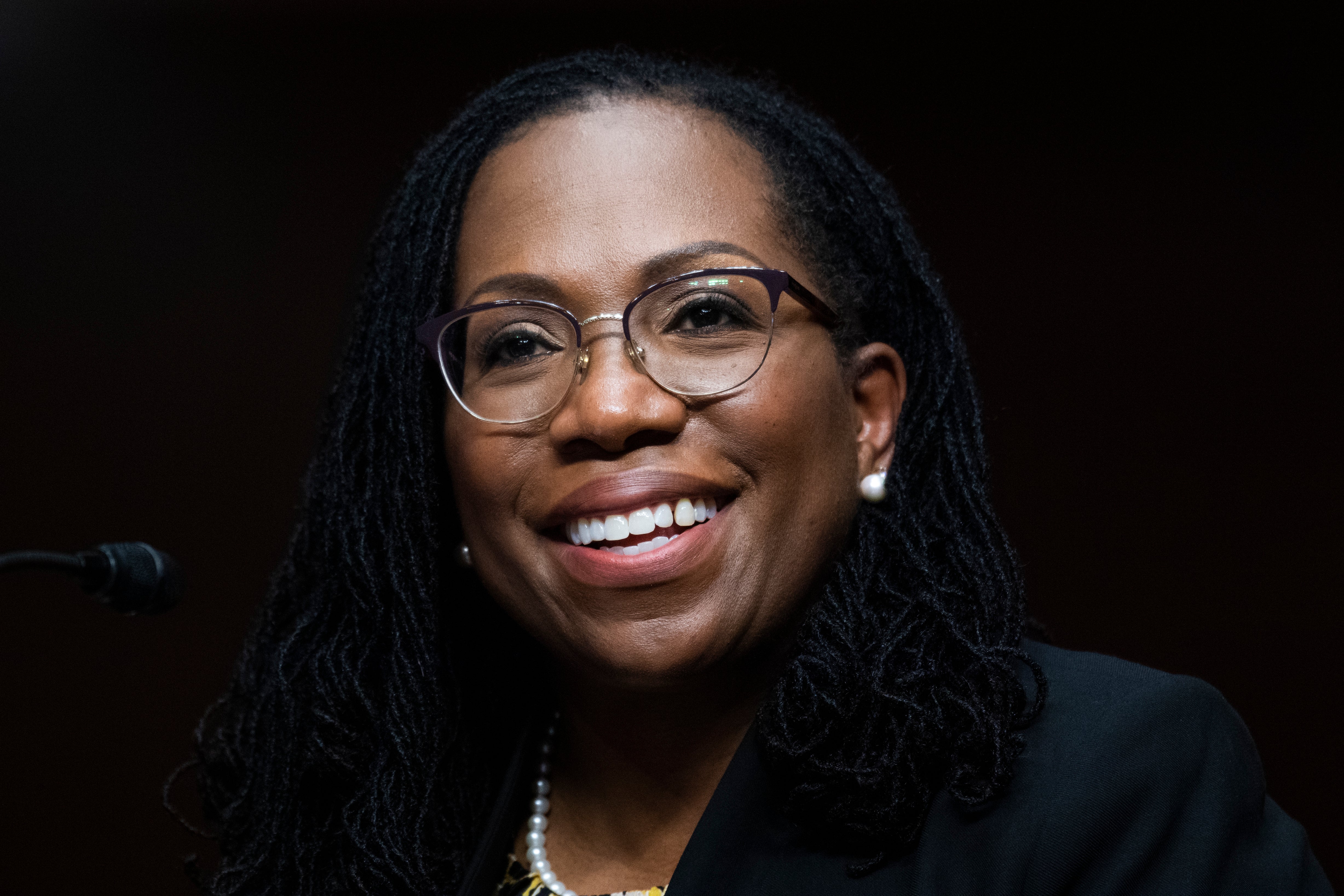Ketanji Brown Jackson: Biden nominates first Black woman justice for Supreme Court
Jackson was largely considered the frontrunner for the nomination to replace Stephen Breyer

US president Joe Biden announced he will nominate Judge Ketanji Brown Jackson to the Supreme Court, making her the first Black female Supreme Court nominee.
Mr Biden made the announcement on Friday morning after media reports said he would make the nomination by the end of the week.
“Today, as we watch freedom and liberty under attack abroad, I’m here to fulfill my responsibilities under the Constitution to preserve freedom and liberty here in the United States of America,,” he said, alluding to Russia invading Ukraine.
Ms Jackson was one of the three potential nominees, along with Judge J Michelle Childs, a US district court judge for the District of South Carolina, and Leondra Kruger, an associate justice on California’s supreme court.
The nomination comes after Supreme Court Justice Stephen Breyer announced he would step down from the court at the end of last month. Mr Biden had said he would announce a nominee by the end of February.
Mr Biden pledged on the campaign trail to nominate a Black woman to the Supreme Court, as a Black woman had never served on the bench. Mr Biden stressed the urgency of appointing a Black woman to the court.
“For too long, our government and our courts haven't looked like America. And I believe it's time we have a court that reflects the full talents and greatness of our nation,” he said.
Ms Jackson serves as a judge on the US Court of Appeals for the District of Columbia Circuit, where she replaced Attorney General Merrick Garland. The court is often seen as a stepping stone to the Supreme Court, with Justices John Roberts, Clarence Thomas, and Brett Kavanaugh serving on the court before their nominations.
The Senate voted to confirm her to the court in June with three Republicans – Lindsey Graham of South Carolina, Lisa Murkowski of Alaska and Susan Collins of Maine – voting alongside every Democrat. Prior to that, she served as a judge on US District Court for the District of Columbia from 2013 to 2021.
But Mr Graham, who had praised Ms Childs, chided Mr Biden’s nomination of Ms Jackson, saying his former friend caved to progressive pressure.
“The attacks by the left on Judge Childs from South Carolina apparently worked,” he said. “I expect a respectful but interesting hearing in the Senate Judiciary Committee. The Harvard-Yale train to the Supreme Court continues to run unabated.”
House Majority Whip James Clyburn, who endorsed Mr Biden after he pledged to nominate a Black woman to the court, also lobbied for Ms Childs. But Representative Joyce Beatty, chair of the Congressional Black Caucus, praised the announcement and noted her history of bipartisan support.
The White House also named former senator Doug Jones of Alabama, who lost his race in 2020 to Tommy Tuberville, to shepherd the nomination through the Senate.
Ms Murkowski was also cryptic in her statement upon Ms Jackson’s nomination despite previously voting to confirm her.
“I’ve been clear that previously voting to confirm an individual to a lower court does not signal how I will vote for a Supreme Court justice. I am committed to doing my due diligence before making a final decision on this nominee,” she said in a statement.
Ms Jackson previously clerked for Mr Breyer from 1999 to 2000 and, if confirmed, would be the only former public defender who served on the court, having served as an assistant federal defender in Washington DC from 2005 to 2007.
“Justice Breyer, the members of the Senate will decide if I fill your seat, but please know I could never fill your shoes,” she said at the White House on Friday.
Ms Jackson’s potential confirmation would not change the ideological makeup of the court, as Mr Breyer was the court’s leading liberal. Former President Donald Trump nominated three justices: Neil Gorsuch, Brett Kavanaugh and Amy Coney Barrett.
Ms Barrett’s confirmation after the death of Ruth Bader Ginsburg tilted the court in favour of conservatives, giving them six justices, along with associate justices Samuel Alito and Clarence Thomas, as well as Chief Justice John Roberts.
Senate majority-leader Chuck Schumer pledged a swift confirmation process under Senate Judiciary Committee chair Dick Durbin, but Democrats would need all 50 Democrats on board to confirm Ms Jackson, with vice president Kamala Harris serving as the tiebreaker if no Republican votes to confirm Ms Jackson.
“Once the president sends Judge Jackson’s nomination to the Senate, Senate Democrats will work to ensure a fair, timely, and expeditious process – fair to the nominee, to the Senate, and to the American public,” he said in a statement.
Civil rights organisations praised the nomination. The Leadership Conference on Civil and Human Rights applauded the decision to nominate a former public defender.
“His nomination today will move us one step closer to a Court that reflects the diversity of America and is committed to protecting the rights of all,” it tweeted.
Join our commenting forum
Join thought-provoking conversations, follow other Independent readers and see their replies
Comments

Bookmark popover
Removed from bookmarks